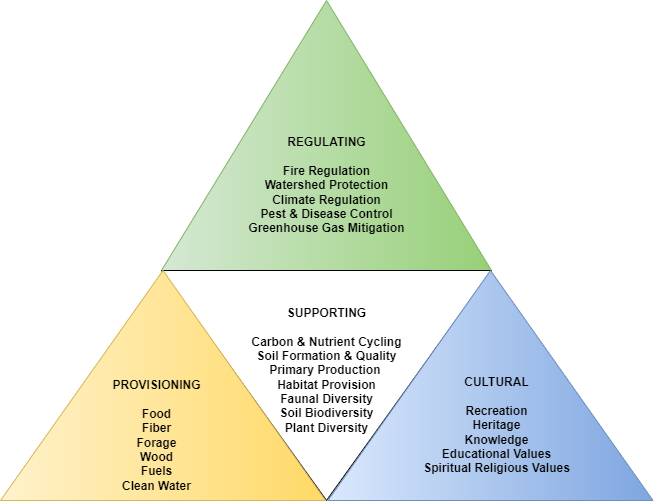Climate and Ecosystem Services
Types of Ecosystem Services
The Millennium Ecosystem Assessment (MA) was a significant UN-backed initiative that assessed the effect of human activities on ecosystems and human well-being. The study identified four primary categories of ecosystem services, which are provisioning, regulating, cultural, and supporting services. These categories represent the various benefits that humans derive from the natural environment, such as the provision of resources for sustenance, the regulation of natural processes, the cultural and spiritual significance of nature, and the foundational support that the environment provides for human activities. The MA's findings highlight the importance of protecting and preserving these critical ecosystem services for the continued health and well-being of both humans and the planet.

Approaches
We are committed to the protection and promotion of sustainable ecosystem services and environmental practices.
We aim to develop and promote a model that promote sustainable land-use practices that help to conserve and enhance ecosystem services, such as soil fertility, water quality, and biodiversity. We will achieve this by conducting research on the most effective and appropriate sustainable land-use practices, and by disseminating this knowledge to relevant stakeholders, including farmers, policymakers, and the general public. Secondly, we aim to conduct research on the impacts of climate change and other environmental stressors on agricultural and other land-use systems in Nepal. This will involve monitoring and assessing the vulnerability of different ecosystems to environmental stressors, and identifying the most effective and appropriate adaptation and mitigation strategies to address these challenges.
The CESAR ecosystem services and environment themes aim to promote sustainable development and management of ecosystems, with a focus on supporting different stakeholders and right holders, including local communities by engaging in a range of functions, including:

Monitoring
We aim to help monitor ecosystem health and identify areas where interventions are needed to promote sustainable development. This could include tracking changes in biodiversity, water quality, or soil health with scientific approaches.
Accessing
We aim to facilitate access to information, data, and resources needed to make informed decisions about ecosystem management. This might involve building networks, developing tools and resources, or providing training and capacity-building support to local communities and stakeholders.

Promoting evidence-based Policy Formulation
We aim to support evidence-based policy formulation that takes into account the complex social, economic, and environmental factors that influence ecosystem health and sustainable development. This could include engaging in policy research and analysis, building partnerships with policymakers and other stakeholders, and advocating for policy changes at the local, national, or international level.
Supporting Ecosystem Management
We aim to provide technical support, training, and other resources to help local communities and stakeholders manage ecosystems in a sustainable way. This might involve providing guidance on best practices for farming, forestry, or fisheries, or supporting the development of alternative livelihoods that promote sustainable use of natural resources.

Engaging in Advocacy and Awareness-raising
We aim to raise awareness about the importance of ecosystems and the need for sustainable development. This might involve engaging in public education campaigns, building partnerships with media outlets and social influencers, or organizing events and activities that promote sustainable development.